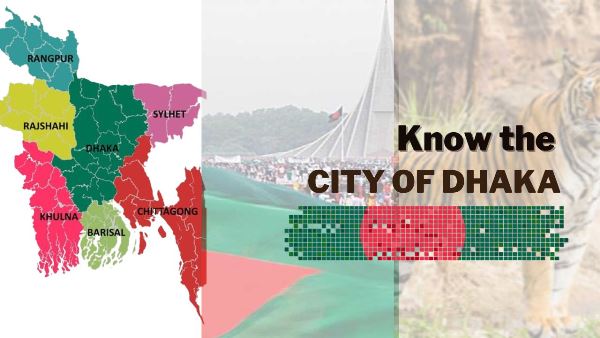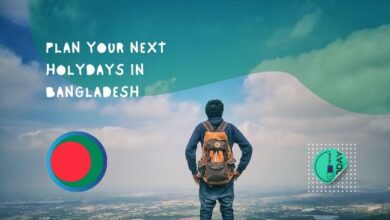Everything You Wanted to Know the City of Dhaka, Bangladesh

Dhaka, the vibrant capital city of Bangladesh, is a place that is rich in history, culture, and diversity. Located on the banks of the Buriganga River, Dhaka is not only the largest city in Bangladesh but also one of the most densely populated cities in the world. In this blog post, we will explore the significance of Dhaka and delve into its fascinating history, geography, demographics, and cultural heritage.
History of Dhaka
Dhaka holds immense importance in the context of Bangladesh. It is the political, economic, and cultural hub of the country, serving as the center of government, commerce, and education. The city is a melting pot of different cultures, religions, and traditions, making it a truly unique and vibrant place to explore.
The origins of Dhaka can be traced back to the 7th century when it was a small trading center. Over the centuries, it grew in importance and became a prominent city during the Mughal Empire. Dhaka served as the provincial capital of Bengal and was known for its flourishing textile industry, which attracted merchants and traders from all over the world.
During the British colonial period, Dhaka underwent significant changes. It became a major administrative and commercial center, with the British establishing educational institutions and introducing modern infrastructure. The city’s architectural landscape was also influenced by the British, with many colonial-era buildings still standing today.
Geography and Demographics
Geographically, Dhaka is situated in the central part of Bangladesh, making it easily accessible from all corners of the country. The city is characterized by its flat terrain, with the Buriganga River flowing through its heart.
The city of Dhaka itself has a population of around 10.2 million people. This makes it the 9th largest city in the world by population. The wider Dhaka Metropolitan Area, which includes the city of Dhaka and its surrounding suburbs, has a much larger population of over 22.4 million people. This makes it one of the most populous metropolitan areas in the world, and the 7th most densely populated.
The city is also home to a diverse range of ethnic communities, including Bengalis; Muslims, Hindus, Buddhist and Christians.
Dhaka is divided into several neighborhoods and districts, each with its own distinct character. Some of the major neighborhoods include Old Dhaka, Gulshan, and Uttara. Old Dhaka, with its narrow streets and bustling markets, is a treasure trove of historical landmarks and cultural heritage. Gulshan, on the other hand, is a modern and upscale area with luxurious residential buildings, shopping malls, and international restaurants.
Culture and Heritage
The cultural richness of Dhaka is truly remarkable. The city is a hub of art, literature, music, and dance. Traditional Bengali music and dance forms, such as Baul and Jatra, are still practiced and celebrated in Dhaka. The city is also home to numerous art galleries and museums, showcasing the works of renowned Bangladeshi artists.
Dhaka is dotted with historical landmarks and monuments that reflect its glorious past. Lalbagh Fort, a 17th-century Mughal fort, is a must-visit attraction. Its beautiful architecture and serene surroundings make it a popular spot for tourists and locals alike. Ahsan Manzil, also known as the Pink Palace, is another iconic landmark that showcases the grandeur of the Nawabs of Dhaka. Jatiyo Sangsad Bhaban, the National Parliament House, is a modern architectural marvel that represents the country’s democratic values.
Dhaka is also known for its vibrant festivals and celebrations. The Bengali New Year, known as Pohela Boishakh, is celebrated with great enthusiasm and includes colorful processions, cultural performances, and traditional food. Eid-ul-Fitr and Eid-ul-Adha, two major Muslim festivals, are also celebrated with much fervor and joy in Dhaka.
Economy and Trade
The economic significance of Dhaka cannot be overstated. It is the biggest city in Bangladesh and contributes significantly to the country’s GDP. The city is home to major industries and sectors such as garments and textiles, pharmaceuticals, jute, leather goods, and IT services. Dhaka’s strategic location and well-developed infrastructure make it an ideal place for local and international businesses to thrive.
Dhaka serves as a major hub for commerce and trade, both domestically and internationally. The city is equipped with modern facilities such as the Dhaka Export Processing Zone and the Dhaka Stock Exchange, attracting investors and fostering economic growth. Its proximity to major ports and airports enables efficient import and export activities, making Dhaka an important trade gateway for Bangladesh.
Education and Innovation
Education is highly valued in Dhaka, and the city boasts numerous educational institutions and universities. Dhaka University, the oldest and most prestigious university in the country, is renowned for its academic excellence. Other prominent educational institutions in Dhaka include Bangladesh University of Engineering and Technology, North South University, and BRAC University. These institutions contribute to the knowledge economy by producing skilled professionals and fostering innovation.
Lifestyle and Cuisine
In terms of lifestyle, Dhaka offers a unique blend of urban living and traditional charm. The city is known for its fast-paced lifestyle, with modern shopping malls, restaurants, and entertainment venues catering to the diverse tastes of its residents and visitors. Popular recreational spots include Gulshan Lake Park, Hatirjheel Lake, and the National Botanical Garden.
Dhaka’s cuisine is a reflection of the country’s rich culinary heritage. The city is famous for its street food culture, with vendors selling mouthwatering delicacies such as pani puri, jhalmuri, and fuchka. Traditional Bangladeshi dishes like biryani, kacchi biryani, and hilsa fish curry can be found in local restaurants, offering a delightful culinary experience.
Challenges and Opportunities
Dhaka faces several challenges, including rapid urbanization, inadequate infrastructure, and environmental concerns. The city’s population growth has put a strain on resources, leading to issues such as traffic congestion and insufficient housing. Efforts are being made to address these challenges through urban planning and development projects.
Despite the challenges, Dhaka presents numerous opportunities for growth and development. The city’s strategic location, skilled workforce, and entrepreneurial spirit make it an attractive destination for investment and business expansion. With the right infrastructure and policies in place, Dhaka has the potential to become a regional economic powerhouse, benefiting not only Bangladesh but also the entire South Asian region.
Cost of Living
In terms of cost of living, Dhaka offers a range of housing options to suit different budgets. Rental prices vary depending on the location and amenities, while hotels cater to both budget and luxury travelers. Daily expenses, including food and dining, are generally affordable, with a wide range of options available to suit different tastes and budgets.
Accommodation
- Rent for a one-bedroom apartment in the city center can range from 15,000 to 30,000 BDT (approximately $170-$340) per month.
- Utilities like electricity, water, and internet typically cost around 2,000 to 5,000 BDT (approximately $20-$55) per month.
Food
- A meal at a local restaurant can cost as little as 50-100 BDT (approximately $0.50-$1.00).
- Groceries for basic meals can cost around 5,000-10,000 BDT (approximately $55-$110) per month.
Transportation
- Public transportation, such as buses and rickshaws, is very affordable, with fares starting at around 10 BDT (approximately $0.10).
- Taxi rides can be more expensive, costing around 100-200 BDT (approximately $1-$2) per kilometer.
Other expenses
- Phone bills can cost around 500-1,000 BDT (approximately $5-$10) per month.
- Entertainment costs can vary depending on your activities, but you can expect to pay around 200-500 BDT (approximately $2-$5) for a movie ticket.
Public Transport
Dhaka’s transportation system is a mix of buses, rickshaws, and ride-sharing services. Buses are the most common mode of public transportation, offering a relatively inexpensive way to navigate the city. Rickshaws, on the other hand, are a popular and iconic means of transport, particularly for short distances. Ride-sharing services like Uber and Pathao also operate in Dhaka, providing convenience and comfort to commuters.
How to Arrive in Dhaka
For travelers arriving in Dhaka, air travel is the most common option. Shahjalal International Airport is the primary gateway to the city, serving both domestic and international flights. Several airlines operate routes to and from Dhaka, connecting the city to major destinations around the world. Land travel is also possible, with bus services and train services connecting Dhaka to various parts of the country.
By Air
Book a Flight
Choose a suitable airline and book a flight to Hazrat Shahjalal International Airport (DAC), which is the main airport serving Dhaka.
Arrival at Hazrat Shahjalal International Airport
Upon arrival, go through immigration and customs procedures. Make sure to have all necessary travel documents, including your passport, visa, and any required permits.
Transport from the Airport to the City
Taxis rideshare services, and airport shuttles are available at the airport for transportation to the city center. Make sure to use authorized services to avoid any issues.
Visa Requirements
Check the visa requirements for Bangladesh before your trip. Depending on your nationality, you may need a visa to enter the country. Secure the requisite visa beforehand if necessary.
Transportation within Dhaka
Taxis and Rideshare: Taxis are readily available in Dhaka. Another option is to utilize rideshare services such as Uber or local alternatives.
Public Transportation: Dhaka has a public transportation system, including buses and rickshaws. Expect significant traffic congestion within the city.
Accommodations
Book Accommodations in Advance
To ensure a smooth stay, consider booking your accommodation in advance. Dhaka offers a range of hotels, guesthouses, and other lodging options.
Local Currency
Exchange Currency: Exchange some currency upon arrival at the airport or in the city to have local currency (Bangladeshi Taka) for your expenses.
Language
Language Consideration:
Bengali is the official language, but English is widely spoken in tourist areas. Acquiring some fundamental Bengali phrases can enrich your experience.
Safety Tips
Stay aware of your surroundings, be cautious with your belongings, and follow local safety guidelines.
Cultural Considerations
Respect Local Customs; Take the time to acquaint yourself with the customs and traditions of the region. It’s advisable to dress modestly, particularly when visiting religious sites.
Connectivity in Dhaka
Connectivity in Dhaka is improving, with reliable internet and mobile services available throughout the city. Telecom providers offer a range of packages to suit different needs, ensuring that residents and visitors can stay connected. Local amenities such as markets and shopping centers cater to various needs, while healthcare facilities provide quality medical services.
Best Tourist Places
Dhaka is a city rich in tourist attractions. Historical landmarks like Lalbagh Fort and Ahsan Manzil showcase the city’s architectural heritage. Cultural attractions such as the National Museum and Liberation War Museum provide insights into Bangladesh’s history and culture. Parks and recreational areas like Ramna Park and Dhanmondi Lake offer a respite from the bustling city life. Religious sites such as Dhakeshwari Temple and Star Mosque are also worth visiting. Shopping enthusiasts can explore destinations like New Market and Bashundhara City Mall for a unique shopping experience.
Here are some of the best tourist places in Dhaka
- Ahsan Manzil Museum: This 1800s palace of the Nawabs of Dhaka features an iconic pink facade, a dome & period furnishings. It is now a museum showcasing the rich history and culture of Dhaka.
- Central Shaheed Minar: This national memorial is dedicated to the Bengali Language Movement activists killed during protests in 1952. It is a powerful symbol of Bangladeshi nationalism and a must-visit for history buffs.
- Lalbagh Fort: This 1600s fort complex with 3 buildings, including a mosque, contains paintings, antiques & weapons. It offers a glimpse into the Mughal era and is a popular spot for picnics and leisure.
- Ramna Park: This large, tranquil green space with trees, formal gardens, paved walkways, a lake & a racecourse is a great place to escape the hustle and bustle of the city. It is perfect for a relaxing stroll or a picnic.
- Hatirjheel Lake: This man-made lake is a popular spot for boating, fishing, and picnicking. It is also a great place to take in the city skyline.
Here are some interesting facts about these places
- Ahsan Manzil Museum was once the seat of the Nawabs of Dhaka, who ruled the region for over 200 years.
- The Central Shaheed Minar was designed by renowned Bangladeshi artist Hamidur Rahman.
- Lalbagh Fort was built by Mughal emperor Aurangzeb and was once his residence.
- Ramna Park was originally a hunting ground for the Nawabs of Dhaka.
- Hatirjheel Lake was created in the 1980s as part of a project to improve the city’s drainage system.
Emergency Response
In case of emergencies, Dhaka has a reliable emergency response system. Police services can be reached through the emergency hotline, and police stations are located throughout the city. Medical services, including hospitals and clinics, are readily available, and ambulance services ensure prompt response in case of medical emergencies. Fire services are also equipped to handle fire-related incidents.
Here are some essential emergency response contacts you should save when visiting Dhaka as a tourist:
General Emergency
999: This is the national emergency number for Bangladesh, accessible from any mobile or landline phone. It connects you to a call center that will dispatch the appropriate emergency services (police, ambulance, fire) based on your need.
Police
- Dhaka Metropolitan Police: 02-8614300
- National Tourist Police Hotline: 01320-222222, 01887-878787
- Tourist Police Website: http://tourist.police.gov.bd/
Fire Department
- Dhaka Fire Service: 02-223383614
- All Number by Area: Link
Ambulance
- Dhaka Ambulance Service: 01714-325325 or 01993800900 (24/7)
Medical Emergencies
- Combined Military Hospital (CMH): 02-9110345, 02-9870011, 02-882770. Mobile: +8801769013311(Emergency & Casualty)
- Square Hospitals Ltd.: Phone: (880-2) 8144400, 8142431 · Mobile: 01713141447
Other Important Contacts
- U.S. Embassy in Bangladesh: (88) (02) 5566-2000
- British High Commission Dhaka: +88 02 55668700
- Canadian High Commission: +880 2 5566 8444 ; Fax: +880 2 5566 8423
- Australian High Commission: telephone: +61 2 6261 3305 (from Bangladesh) or +6 1300 555 135 (within Australia)
Additional Tips
- Save these contact numbers in your phone before you travel.
- Learn some basic Bengali phrases for emergencies, such as “ami bhaya paachi” (I am scared) or “pomochay chai” (I need help).
- Carry a photocopy of your passport and important documents with you.
- Be aware of your surroundings and trust your instincts. If you feel unsafe, don’t hesitate to contact the police or your embassy.
Future Prospects of Dhaka, Bangladesh
Looking to the future, Dhaka has ambitious plans for urban planning and development. Projects such as the Dhaka Metro Rail are aimed at improving transportation and reducing traffic congestion. The city envisions a future that is sustainable, inclusive, and technologically advanced. Dhaka’s growth and development have the potential to positively impact not only Bangladesh but also the South Asian region as a whole.
Conclusion
Dhaka is a city that offers a unique blend of history, culture, and economic opportunities. Its economic significance, educational institutions, and vibrant lifestyle make it an attractive destination for residents, businesses, and tourists alike. With ongoing efforts to address challenges and capitalize on opportunities, Dhaka is poised to continue its growth and contribute to the region’s development. We invite you to explore and experience the vibrant culture and charm of Dhaka for yourself.




